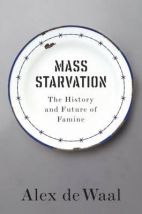Mass Starvation: The History and Future of Famine

In surveying how recent famines differ from those in previous eras, Mass Starvation makes some provocative points. One is that the incidence of modern famine is exaggerated, partly because of media cycles and political calculations. Another is that famine is political, not ecological – a matter of governance and policy, rather than droughts and climate change. This means that famine is absolutely avoidable. It also leads to de Waal’s overarching declaration: “one course of action stands out above all others: branding mass starvation as a crime and expressly prohibiting it” (xii). It’s unclear how exactly famine could be criminalized, but de Waal argues that this is urgent for assigning accountability and avoiding future disasters.
The good news is that famine has declined precipitously in the past few decades. Post-1980 there are fewer incidents of mass starvation, and fewer deaths during the famines that do occur. de Waal – who coined the term “famine crime” several decades ago while studying famine in Sudan and Ethiopia – explains that colonialism, totalitarianism, communism and international war largely explain the famines that occurred before 1980, while subsequent famines have been attributed to civil war. He adds that famines have increasingly become a political tool or a component of mass atrocities, and have diminished as political freedoms have expanded.
As well, the humanitarian sector has become increasingly sophisticated. For instance, aid workers learned painful lessons about the militarization of aid during Operation Restore Hope in Somalia in the 1990s, when civilians were killed by both the US military and outraged crowds. Another important event showing the problems of humanitarian logic was the provision of aid to refugees in eastern Zaire fleeing (and in some cases perpetrating) the Rwandan genocide, but the relative inability to support those left within Rwanda’s borders because their food insecurity didn’t fit within existing humanitarian categories.
de Waal urges readers to avoid complacency, and to turn attention to ongoing and future famines. He stresses that starvation isn’t a passive state, but an action done by some people to others. Thus he writes of “forced mass starvation” in order to focus on the agency and political will behind such tragedy. A “forced mass starvation” perspective might link the famine in Yemen that began in 2015 with not only a weakening economy and internal conflict, but also a blockade by the Gulf Cooperation Council, supported by the UN Security Council. de Waal argues that UN agencies and the press have been coy about singling out Saudi Arabia, the US, and the UK for their role in precipitating the food crisis. Yet “Should a famine rage in Yemen, the culpability for creating it and covering it up will lie primarily with the Saudi-led military coalition and its use of indiscriminate economic warfare” (page 190).
The human tragedies recounted in these pages are of course bleak. But the book’s style is accessible, and its message – that we can eradicate mass starvation, with sufficient political will – is galvanizing.
Further reading:
Cohen, Marc J and James L Garrett (2010), “The food price crisis and urban food (in)security”, Environment and Urbanization Vol 22, No 2, pages 467–482, available at http://journals.sagepub.com/doi/pdf/10.1177/0956247810380375.
Environment and Urbanization (2017), “The urbanization of humanitarian crises”, Vol 29, No 2, available at http://journals.sagepub.com/toc/eaua/28/1.
Plümper, Thomas and Eric Neumayer (2008), “Famine mortality, rational political activity, and international food aid”, World Development Vol 37, No 1, pages 50–61, available at http://www.lse.ac.uk/website-archive/GeographyAndEnvironment/neumayer/pd....
Book note prepared by Christine Ro
Search the Book notes database
Our Book notes database contains details and summaries of all the publications included in Book notes since 1993 - with details on how to obtain/download.
Use the search form above, or visit the Book notes landing page for more options and latest content.
For a searchable database for papers in Environment and Urbanization, go to http://eau.sagepub.com/

